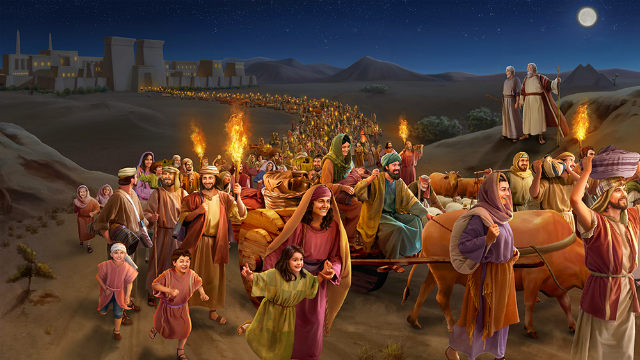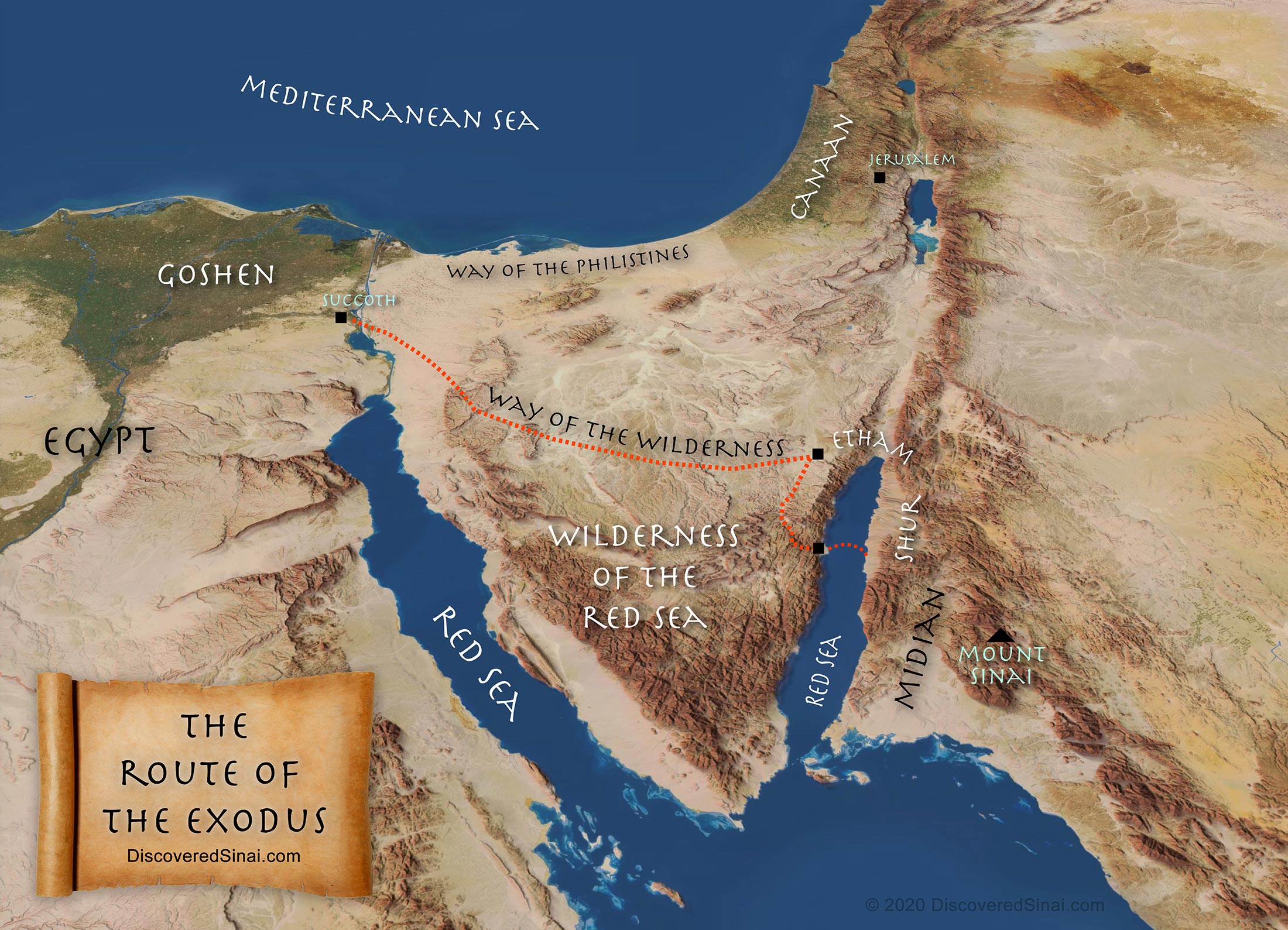The Exodus From Egypt: A Journey Of Faith And Freedom
The Exodus from Egypt: A Journey of Faith and Freedom
Related Articles: The Exodus from Egypt: A Journey of Faith and Freedom
Introduction
In this auspicious occasion, we are delighted to delve into the intriguing topic related to The Exodus from Egypt: A Journey of Faith and Freedom. Let’s weave interesting information and offer fresh perspectives to the readers.
Table of Content
The Exodus from Egypt: A Journey of Faith and Freedom

The Exodus, a pivotal event in the Hebrew Bible and a cornerstone of Jewish faith, recounts the liberation of the Israelites from slavery in Egypt under the leadership of Moses. This epic journey, spanning generations and etched in the collective memory of the Jewish people, transcends mere historical narrative. It is a story of resilience, divine intervention, and the enduring power of hope.
Mapping the Exodus: A Geographic Journey
The Exodus journey, as depicted in the Book of Exodus, unfolds across a complex and diverse landscape, encompassing a multitude of geographic locations. While the exact route remains a subject of ongoing debate among historians and archaeologists, the biblical account provides a general framework for understanding the Israelites’ path to freedom.
The Starting Point: The Land of Goshen
The Israelites’ enslavement began in the land of Goshen, located in the northeastern Nile Delta of Egypt. Goshen, a fertile region, provided ample resources for the Israelites to thrive, contributing to their growing population. This location, strategically positioned near the eastern border of Egypt, facilitated the Israelites’ eventual escape.
The Crossing of the Red Sea
The most iconic event of the Exodus, the parting of the Red Sea, serves as a testament to the Israelites’ faith and God’s intervention. The exact location of this crossing remains a subject of scholarly debate, with theories ranging from the Gulf of Suez to the Reed Sea, a shallow lagoon near the Nile Delta. Regardless of the specific location, the Red Sea crossing symbolizes the Israelites’ escape from Egyptian oppression and the beginning of their journey towards freedom.
The Wilderness of Sinai
After crossing the Red Sea, the Israelites entered the Sinai Peninsula, a vast, arid desert region. This desolate landscape served as a testing ground for the Israelites’ faith and a crucible for their transformation. The wilderness of Sinai was where God revealed the Ten Commandments to Moses, establishing the foundation for the covenant between God and the Israelites.
The Wandering in the Wilderness
The Israelites spent forty years wandering in the wilderness, a period of trials and tribulations. This arduous journey tested their resilience and their faith in God’s guidance. The wilderness, a harsh and unforgiving environment, served as a metaphor for the Israelites’ journey from slavery to freedom, highlighting the challenges and sacrifices they endured.
The Promised Land: Canaan
The culmination of the Exodus journey was the arrival at the Promised Land, Canaan, a land flowing with milk and honey. This land, promised by God to Abraham and his descendants, symbolized the Israelites’ ultimate destination and the fulfillment of their liberation.
The Significance of the Exodus
The Exodus narrative holds profound significance, not only for the Jewish people but also for broader human understanding. It offers a powerful testament to the enduring power of faith, the importance of freedom, and the enduring struggle against oppression. The Exodus story serves as a source of inspiration and hope for individuals and communities facing adversity.
The Importance of the Exodus in Jewish History
For the Jewish people, the Exodus represents the foundation of their identity and their covenant with God. It is a story that is passed down through generations, serving as a reminder of their ancestors’ struggles and their enduring faith. The Exodus is a central theme in Jewish tradition, influencing their religious practices, holidays, and cultural heritage.
The Exodus as a Universal Story
The Exodus story transcends its Jewish origins, resonating with people of diverse backgrounds and cultures. Its themes of liberation, freedom, and the pursuit of justice speak to the universal human experience. The Exodus narrative has inspired countless works of art, literature, and music, reflecting its enduring power and relevance.
The Exodus in Contemporary Society
The Exodus story continues to resonate in contemporary society, serving as a powerful symbol of hope and resistance. It inspires movements for social justice, human rights, and the fight against oppression. The Exodus narrative reminds us of the importance of standing up for what is right and the power of collective action in the face of injustice.
FAQs on the Exodus from Egypt
1. What is the Exodus?
The Exodus is the story of the Israelites’ liberation from slavery in Egypt under the leadership of Moses, as recounted in the Hebrew Bible.
2. When did the Exodus occur?
The exact date of the Exodus is debated, with estimates ranging from the 15th to the 13th century BCE.
3. Where did the Exodus take place?
The Exodus journey spanned a vast geographic area, including the land of Goshen in Egypt, the Sinai Peninsula, and the Promised Land of Canaan.
4. What are the key events of the Exodus?
Key events include the Ten Plagues, the parting of the Red Sea, the giving of the Ten Commandments, and the forty years of wandering in the wilderness.
5. What is the significance of the Exodus?
The Exodus is a pivotal event in Jewish history, symbolizing liberation, freedom, and the covenant between God and the Israelites. It also holds broader significance as a story of resilience and the pursuit of justice.
6. How does the Exodus relate to contemporary society?
The Exodus story continues to inspire movements for social justice, human rights, and the fight against oppression.
Tips for Understanding the Exodus
- Read the Book of Exodus: The primary source for understanding the Exodus is the Book of Exodus in the Hebrew Bible.
- Explore different interpretations: The Exodus has been interpreted in diverse ways throughout history. Consider different perspectives to gain a more comprehensive understanding.
- Study the geography: Familiarize yourself with the geographical locations mentioned in the Exodus narrative to gain a better sense of the journey.
- Reflect on the themes: The Exodus story is rich in themes, including faith, freedom, justice, and resilience. Reflect on these themes and their relevance to your own life.
- Engage in dialogue: Discuss the Exodus with others, sharing your insights and perspectives.
Conclusion
The Exodus from Egypt remains a profound and enduring story, a testament to the power of faith, the importance of freedom, and the enduring struggle against oppression. Its narrative continues to inspire and resonate across cultures and generations, reminding us of the resilience of the human spirit and the pursuit of a just and equitable world. As we reflect on the Exodus story, we are reminded of the enduring power of hope and the importance of standing up for what is right, even in the face of adversity.







Closure
Thus, we hope this article has provided valuable insights into The Exodus from Egypt: A Journey of Faith and Freedom. We appreciate your attention to our article. See you in our next article!
You may also like
Recent Posts
- Navigating The Tapestry Of Singapore: A Comprehensive Guide To Its Districts
- A Comprehensive Guide To The Nangarhar Province Map: Unveiling The Heart Of Eastern Afghanistan
- Navigating The Hub Of The Heartland: A Comprehensive Guide To Kansas City International Airport
- Navigating The Tapestry Of Brooklyn: A Comprehensive Guide To The Borough’s Map
- Navigating The Landscape: A Comprehensive Guide To The Linden, Tennessee Map
- Navigating Brussels Airport: A Comprehensive Guide To The Brussels Airport Map
- Navigating The Beauty Of Caesar’s Creek: A Comprehensive Guide To The Map
- Navigating California’s Natural Wonders: A Comprehensive Guide To State Park Campgrounds
Leave a Reply